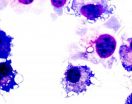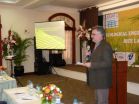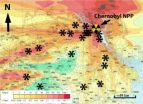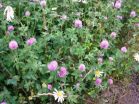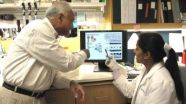(Press-News.org) While many are stocking up on allergy medicine in preparation for spring, a new study from researchers at Virginia Commonwealth University Massey Cancer Center has uncovered a new connection between allergy and cancer that could potentially lead to therapies involving common antihistamines.
Recently published in the Journal of Leukocyte Biology, the study was led by Daniel H. Conrad, Ph.D., member of the Cancer Cell Signaling research program at Massey and professor of microbiology and immunology at the VCU School of Medicine, with substantial contributions from Ph.D. students and co-first authors Rebecca K. Martin and Sheinei J. Saleem. The study demonstrated that histamine, a component of the immune system that responds to allergens and foreign pathogens and is also linked to inflammation, plays a role in protecting tumors from the immune system. By blocking the production of histamine in animal models, the researchers were able to interrupt a process that promotes melanoma growth.
"This research is very exciting as it draws a connection between two diseases that aren't commonly linked: allergy and cancer," says Conrad. "However, it's important to realize that this connection is very novel and further research is needed before we know if antihistamines can be used effectively in cancer therapies."
Histamine is produced by mast cells, which are especially numerous in the nose, mouth and blood vessels to help defend against pathogens and aid in wound healing. The researchers found that histamine induces the activation, survival and proliferation of myeloid derived suppressor cells (MDSCs), which help promote tumor growth by suppressing the immune system. They also discovered that MDSCs tend to migrate toward mast cells, which help traffic the MDSCs to sites of inflammation such as the liver and tumors. The cycle continues as histamine released by mast cells further promotes the survival and proliferation of MDSCs. This occurs in two subpopulations of MDSCs, but most dramatically in the monocytic subpopulation. Through their experiments, the researchers showed that monocytic MDSCs can be decreased by over-the-counter antihistamines such as cetirizine (Zyrtec) and cimetidine (Tagamet).
In addition, the researchers found that patients experiencing allergic symptoms have more MDSCs circulating in their bloodstream than non-allergic patients.
"MDSCs have generated a great deal of interest in recent years because they limit the effects of the immune response against cancer," says study collaborator Harry D. Bear, M.D., Ph.D., member of the Developmental Therapeutics research program at Massey, professor and chair of the Division of Surgical Oncology at the VCU School of Medicine and director of the Breast Health Center at VCU Health System. "Now that we have shown that antihistamines can interfere with the production of MDSCs, we are hopeful that we may be able to use them to restore the immune system's ability to fight off tumors."
Previously, the research team found that mast cells were essential for MDSC activity. Their next step is to further dissect the mechanism of the mast cell and MDSC interaction and the involvement of other mast cell mediators, like histamine, in MDSC function.
INFORMATION:
In addition to Martin and Saleem, Conrad and Bear collaborated on this study with John J. Ryan, Ph.D., member of the Cancer Cell Signaling research program at Massey and professor of biology at the VCU College of Humanities and Sciences; Anne-Marie Irani, M.D., professor of allergy and immunology in the Department of Pediatrics at the VCU School of Medicine; Lauren Folgosa, M.D. / Ph.D. student from the Center for Clinical and Translational Research; Sheela R. Damle, M.D. / Ph.D. student; and Hanna B. Zellner and Giang-Kim T. Nguyen, research technicians from the Department of Microbiology and Immunology at the VCU School of Medicine.
This study was supported by National Institutes of Health grants R01AI186097, U19AI1077425 and F31CA159877; a National Health and Medical Research Council Project 2 grant; American Asthma Foundation grant 11-0094; a Massey pilot grant; and, in part, by Massey's National Cancer Institute Cancer Center Support Grant P30CA016059.
The full manuscript of this study is available online at: http://www.jleukbio.org/content/early/2014/03/06/jlb.5A1213-644R.full.pdf+html
News directors: Broadcast access to VCU Massey Cancer Center experts is available through VideoLink ReadyCam. ReadyCam transmits video and audio via fiber optics through a system that is routed to your newsroom. To schedule a live or taped interview, contact Alaina Schneider, (804) 628-4578.
About VCU Massey Cancer Center
VCU Massey Cancer Center is one of only 68 National Cancer Institute-designated institutions in the country that leads and shapes America's cancer research efforts. Working with all kinds of cancers, the Center conducts basic, translational and clinical cancer research, provides state-of-the-art treatments and clinical trials, and promotes cancer prevention and education. Since 1974, Massey has served as an internationally recognized center of excellence. It offers the most cancer clinical trials in Virginia and serves patients at 10 locations. Its 1,000 researchers, clinicians and staff members are dedicated to improving the quality of human life by developing and delivering effective means to prevent, control and ultimately to cure cancer. Visit Massey online at http://www.massey.vcu.edu or call 877-4-MASSEY for more information.
About VCU and the VCU Medical Center
Virginia Commonwealth University is a major, urban public research university with national and international rankings in sponsored research. Located in downtown Richmond, VCU enrolls more than 31,000 students in 222 degree and certificate programs in the arts, sciences and humanities. Sixty-six of the programs are unique in Virginia, many of them crossing the disciplines of VCU's 13 schools and one college. MCV Hospitals and the health sciences schools of Virginia Commonwealth University compose the VCU Medical Center, one of the nation's leading academic medical centers. For more, see http://www.vcu.edu.
Researchers uncover allergy-cancer connection
2014-03-19
ELSE PRESS RELEASES FROM THIS DATE:
Growing rice the sustainable way: LEGATO holds its 3rd annual conference
2014-03-19
In a world facing the challenges of climate change, demographic boom and deficit in food resources, the word "sustainable" and the concept behind it become increasingly relevant. Sustainability in the way humanity uses available resources is key to a brighter and greener future.
In the context of sustainable food production, there is a clear need for crop productivity increases and diversification. Optimising rice ecosystem functions and services in Southeast Asia and their stabilisation under future land use and climate change, is the main focus of the project LEGATO ...
Radiation damage at the root of Chernobyl's ecosystems
2014-03-19
Radiological damage to microbes near the site of the Chernobyl disaster has slowed the decomposition of fallen leaves and other plant matter in the area, according to a study just published in the journal Oecologia. The resulting buildup of dry, loose detritus is a wildfire hazard that poses the threat of spreading radioactivity from the Chernobyl area.
Tim Mousseau, a professor of biology and co-director of the Chernobyl and Fukushima Research Initiatives at the University of South Carolina, has done extensive research in the contaminated area surrounding the Chernobyl ...
Research reveals true value of cover crops to farmers, environment
2014-03-19
Planting cover crops in rotation between cash crops -- widely agreed to be ecologically beneficial -- is even more valuable than previously thought, according to a team of agronomists, entomologists, agroecologists, horticulturists and biogeochemists from Penn State's College of Agricultural Sciences.
"As society places increasing demands on agricultural land beyond food production to include ecosystem services, we needed a new way to evaluate 'success' in agriculture," said Jason Kaye, professor of biogeochemistry. "This research presents a framework for considering ...
Researchers identify potential new therapeutic target for controlling high blood sugar
2014-03-19
DALLAS – March 19, 2014 – A UT Southwestern Medical Center study has identified a new potential therapeutic target for controlling high blood sugar, a finding that could help the estimated 25 million Americans with type 2 diabetes.
Researchers showed that lipid molecules called phosphatidic acids enhance glucose production in the liver. These findings suggest that inhibiting or reducing production of phosphatidic acids may do the opposite.
“This study establishes a role for phosphatidic acids in enhancing glucose production by the liver and identifies enzymes involved ...
NASA sees ex-Tropical Cyclone Gillian affect Indonesia
2014-03-19
The remnants of former Tropical Cyclone Gillian moved out of the Southern Pacific Ocean and into the Indian Ocean only to trigger warnings and watches for part of Indonesia on March 19. NASA's Aqua satellite passed over the stubborn storm and took a visible image of the re-organizing tropical low pressure area.
NASA's Aqua satellite passed over Gillian's remnants on March 19 at 05:30 UTC/1:30 a.m. EDT and the Moderate Resolution Imaging Spectroradiometer or MODIS instrument took a visible picture of the storm. The image showed that the storm appeared to be well-defined, ...
Satellite sees newborn So. Pacific Tropical Storm Mike
2014-03-19
NOAA's GOES-West satellite caught the birth of Tropical Storm Mike in the Southern Pacific Ocean on March 19. Mike's formation has generated warnings for the Southern Cook Islands.
NOAA's GOES-West or GOES-15 satellite captured an infrared image of newborn Tropical Storm Mike in the Southwestern Pacific Ocean on March 19 at 1200 UTC/8 a.m. EDT. Mike appeared to be a compact, rounded tropical storm with bands of thunderstorms wrapping into it. NOAA's GOES-West satellite sits in a fixed orbit in space capturing visible and infrared imagery of all weather over the western ...
The scientific legacy of colonialism in Africa
2014-03-19
Colonial legacy has a significant impact on scientific productivity across the continent of Africa, according to a study by researchers at the University of Lomé, in Togo. Writing in the International Journal of Education Economics and Development, the team suggests that Africa performs relatively poorly compared with other regions of the world. Moreover, their analysis of data for the period 1994 to 2009 shows that African nations with a British colonial legacy are much more productive than countries with French or other history. This, the team adds, correlates with superior ...
French Alps Property Market Witnesses a Surge in Interest From International Buyers
2014-03-19
Demand for property in the Alps is on the increase with a growing number of foreigners looking to invest in resorts such as Chamonix, according to new figures.
Property agents in Chamonix, a resort in France's Savoie region and one of the key Alpine winter destinations, are reporting soaring property demand, much of which is being driven by the international buyers. The real estate agents also revealed an increase in property prices of more than eight per cent during 2013. This surge in interest can be attributed to the infrastructure upgrades in Chamonix and also to ...
Catching the early spread of breast cancer
2014-03-19
DALLAS, March 19, 2014 — When cancer spreads from one part of the body to another, it becomes even more deadly. It moves with stealth and can go undetected for months or years. But a new technology that uses "nano-flares" has the potential to catch these lurking, mobilized tumor cells early on. Today, scientists presented the latest advances in nano-flare technology as it applies to the detection of metastatic breast cancer cells.
The report was one of more than 10,000 at the 247th National Meeting & Exposition of the American Chemical Society (ACS). The meeting is taking ...
Noninvasive colorectal cancer screening tool shows unprecedented detection rates
2014-03-19
ROCHESTER, Minn. — March 17, 2014 — Results of a clinical trial of Cologuard show unprecedented rates of precancer and cancer detection by a noninvasive test. The detection rates are similar to those reported for colonoscopy. The results were published in the March 20 issue of the New England Journal of Medicine (NEJM). Cologuard was co-developed by Mayo Clinic and Exact Sciences.
Cologuard, is a noninvasive sDNA test for the early detection of colorectal precancer and cancer. The Cologuard test is based on a stool sample that is analyzed for DNA signatures of precancer ...
